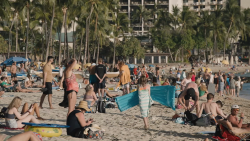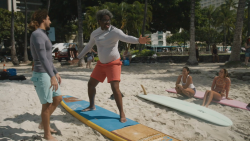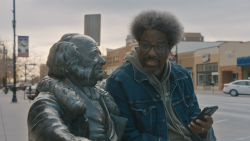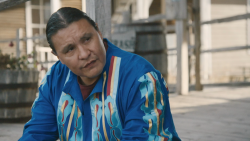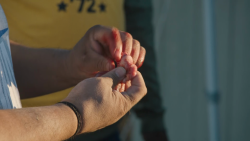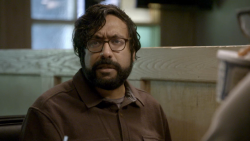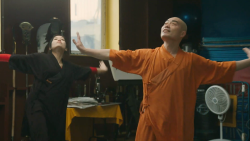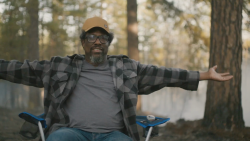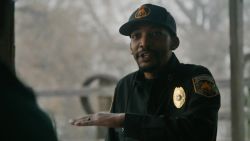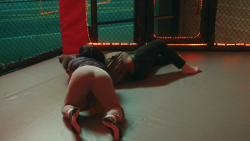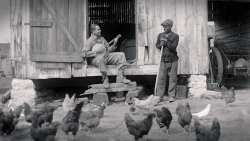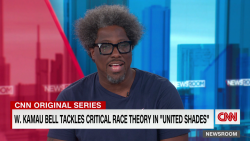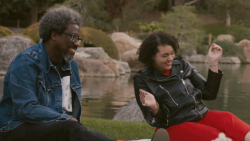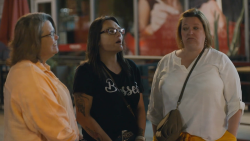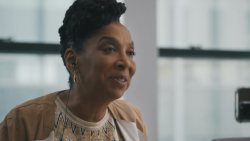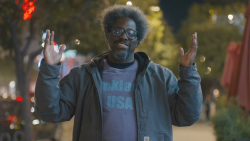Editor’s Note: W. Kamau Bell is a sociopolitical comedian who is the host and executive producer of the Emmy Award-winning CNN Original Series “United Shades of America with W. Kamau Bell.” Kamau has a Netflix stand-up comedy special, “Private School Negro” and a book with the easy-to-remember title “The Awkward Thoughts of W. Kamau Bell: Tales of a 6’ 4”, African American, Heterosexual, Cisgender, Left-Leaning, Asthmatic, Black and Proud Blerd, Mama’s Boy, Dad, and Stand-Up Comedian.” The views expressed here are his; read more opinion on CNN. To learn more about megachurches, watch “United Shades of America with W. Kamau Bell” on Sunday at 10 p.m. ET/PT.
This past weekend at Coachella, rapper/”a-historian“/occasional MAGA-American Kanye West performed as a part of his “Please Just Pay Attention to The Music Tour.” This latest Kanye comeback involves his “Sunday Service” shows. These are performances where Kanye invokes the music and the spirit of the black church and drizzles a Kanye glaze over the top. It is kind of a no-brainer of a comeback for Kanye. If you want to get black people to fall in love with you all over again, and at the same time, if you want us to forgive you, then take us to church … or chuch, depending your pronunciation.
During his show at Coachella, people on Twitter were following along with the service. And Kanye was getting rave reviews. It was great to see the old Kanye and not the new Kanye (because that is getting old). But then something else happened. People began tweeting out pictures of Kanye’s merchandise stand. And that’s when people noticed that Kanye West was selling $50 socks emblazoned with “Jesus” on one and “Walks” on the other and $225 sweatshirts with “Holy Spirit” and “Trust God” arcing across them. And at that point, many of the same people who had been praising the Sunday Service were going full “WTF” about the merch.
Let me be clear. I’m not above buying overpriced concert swag. I have done it many times. And I’m also not above churches selling merchandise to help cover the good deeds they do. And yes, Kanye using Christianity to help sell his overpriced merch seems a little extreme, even for a guy who seems to get bored by not being mired in controversy. But this time I couldn’t be mad at Kanye, because what he was doing is very similar to many current churches. But not the kind of 200-300-seat Baptist and Methodist churches I grew up in. I’m talking about 2,000-seat-and-larger megachurches. In many of these churches, entertainment, commerce and Christianity go hand in hand – as long as those hands are full of cash.
This Sunday on the season premiere of “United Shades of America,” I am looking into megachurches. And the first thing I learned is that all megachurches are not created equally. In the filming of the episode, I spent time at three very different megachurches: the flashy, and entertaining Fellowship Church in Grapevine, Texas, led by Pastor Ed Young and affiliated with the Southern Baptist Convention; Cathedral of Hope United Church of Christ, the world’s largest predominantly LGBTQ church in Dallas, Texas, led by Reverend Dr. Neil Cazares-Thomas; and Friendship-West Baptist Church, also in Dallas, led by Pastor Freddy Haynes. Friendship-West is a Black church that aims to extend the social justice legacy of Martin Luther King, Jr.
On my visit to Fellowship Church, I brought my own minister from Berkeley, California, Pastor Michael McBride. He lets me call him “my minister” even though I’ve only been to his church three times. Pastor Mike’s church is modeled on the kind of churches I grew up in, but with a more radical and inclusive vision. Much like Pastor Haynes, Pastor Mike is extending the legacy of Martin Luther King, Jr. But whereas the civil rights era was mostly defining the world as black and white, Pastor Mike’s church addresses oppression in all its forms and the congregation reflects that. Pastor Mike is not afraid to wade into political issues and take stances that more traditional church leaders either steer clear of or go full Franklin Graham on. Pastor Mike feels like doing this is a part of his calling to preach. And despite the fact he does sermons like “What Would Jesus Say to Donald Trump,” Pastor Ed at Fellowship claims he steers clear of politics. I couldn’t wait to see what would happen when they met. It was worth the wait.
Even though people overall are going to church less and less, more and more megachurches are opening up. This leads to churches competing for audiences. And unfortunately, that competition isn’t usually centered on how well you preach the message of Jesus. Often the competition is centered on how big and new your church is or how expensively dressed you are. There is even an entire Instagram account called Preachers in Sneakers that highlights ministers wearing high-end and/or exclusive footwear. And I’m guessing that the answer to the question, “What would Jesus wear?” would be that Jesus would wear Keens… or maybe Tom’s.
But the issue that I wanted to get to the bottom of in this episode was twofold: money and message. If you want to make your preacher rich, that is fine with me, but I believe that megachurches should have to let us know what they are doing with the money. I believe it should work the same way charities work. Every charity has to let you know how much of the money is going to their mission. But churches don’t have to do that, because church finances are the one and only place where America truly separates church and state. Churches don’t pay income tax or property taxes. And that property tax is a big deal when you are Joel Osteen and your church is in an ex-basketball arena.
I understand that the founders of this country wanted to make sure that no church was stopped from doing good deeds or worse was shuttered because of a high tax bill, but I’m guessing they were thinking of small community churches struggling to get by, not a minister telling his congregation that he needed them to buy him a private jet.
And then there’s the message. In the episode we talk about how different the message of many of these megachurch ministers is from the actual message of Jesus. To paraphrase Pastor Mike, some ministers put too much focus on “What would Jesus do?” Thinking in hypotheticals allows you to create your own personal Jesus who puts America first, and who supports police over people, and who wants the borders closed. Pastor Mike believes Christian ministers should be focused instead on “What did Jesus do? When you did focus on the words and action of Jesus in the Bible, it becomes impossible to encourage your congregation to support President Trump’s damaging policies and hateful rhetoric.
Not matching their methods with the actual message of Jesus is how you end up with church officials allowed to engage in the kind of inappropriate behavior that the Catholic church is known for. On this episode, I sit down with poet and activist Emily Joy, who was inspired by Tarana Burke’s #MeToo to create #ChurchToo. She used to hashtag to tell her story of being 16 years old and being groomed to marry an adult leader of her megachurch. I believe situations like Emily Joy’s happen over and over again because churches have the legal and cultural status to operate mostly in the dark.
Get our free weekly newsletter
If you are truly doing the good deeds that you claim, if you are truly asking people to give you money so that you can help the world, if you are truly creating a loving and supportive community then you should want to show it off. The same way the best charities do. Hiding behind tax-exempt status and the privilege that being a megachurch brings is neither what Jesus would do or what Jesus did do. Welcome to season four of “United Shades of America.”



